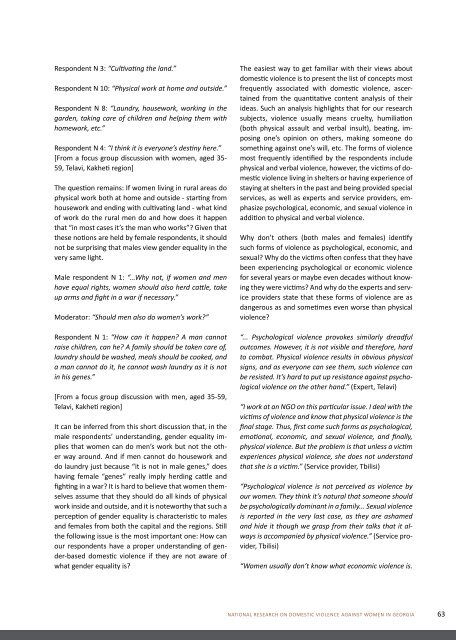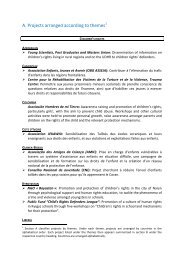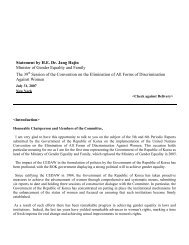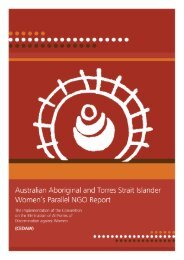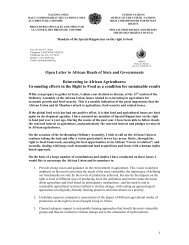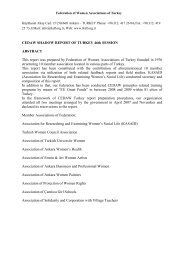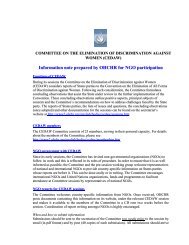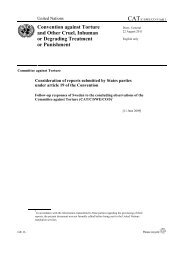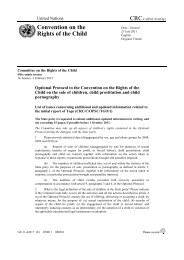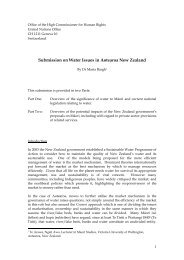National Research on Domestic Violence Against Women in
National Research on Domestic Violence Against Women in
National Research on Domestic Violence Against Women in
You also want an ePaper? Increase the reach of your titles
YUMPU automatically turns print PDFs into web optimized ePapers that Google loves.
Resp<strong>on</strong>dent N 3: “Cultivat<strong>in</strong>g the land.”Resp<strong>on</strong>dent N 10: “Physical work at home and outside.”Resp<strong>on</strong>dent N 8: “Laundry, housework, work<strong>in</strong>g <strong>in</strong> thegarden, tak<strong>in</strong>g care of children and help<strong>in</strong>g them withhomework, etc.”Resp<strong>on</strong>dent N 4: “I th<strong>in</strong>k it is every<strong>on</strong>e’s dest<strong>in</strong>y here.”[From a focus group discussi<strong>on</strong> with women, aged 35-59, Telavi, Kakheti regi<strong>on</strong>]The questi<strong>on</strong> rema<strong>in</strong>s: If women liv<strong>in</strong>g <strong>in</strong> rural areas dophysical work both at home and outside - start<strong>in</strong>g fromhousework and end<strong>in</strong>g with cultivat<strong>in</strong>g land - what k<strong>in</strong>dof work do the rural men do and how does it happenthat “<strong>in</strong> most cases it’s the man who works”? Given thatthese noti<strong>on</strong>s are held by female resp<strong>on</strong>dents, it shouldnot be surpris<strong>in</strong>g that males view gender equality <strong>in</strong> thevery same light.Male resp<strong>on</strong>dent N 1: “...Why not, if women and menhave equal rights, women should also herd cattle, takeup arms and fight <strong>in</strong> a war if necessary.”Moderator: “Should men also do women’s work?”Resp<strong>on</strong>dent N 1: “How can it happen? A man cannotraise children, can he? A family should be taken care of,laundry should be washed, meals should be cooked, anda man cannot do it, he cannot wash laundry as it is not<strong>in</strong> his genes.”[From a focus group discussi<strong>on</strong> with men, aged 35-59,Telavi, Kakheti regi<strong>on</strong>]It can be <strong>in</strong>ferred from this short discussi<strong>on</strong> that, <strong>in</strong> themale resp<strong>on</strong>dents’ understand<strong>in</strong>g, gender equality impliesthat women can do men’s work but not the otherway around. And if men cannot do housework anddo laundry just because “it is not <strong>in</strong> male genes,” doeshav<strong>in</strong>g female “genes” really imply herd<strong>in</strong>g cattle andfight<strong>in</strong>g <strong>in</strong> a war? It is hard to believe that women themselvesassume that they should do all k<strong>in</strong>ds of physicalwork <strong>in</strong>side and outside, and it is noteworthy that such apercepti<strong>on</strong> of gender equality is characteristic to malesand females from both the capital and the regi<strong>on</strong>s. Stillthe follow<strong>in</strong>g issue is the most important <strong>on</strong>e: How canour resp<strong>on</strong>dents have a proper understand<strong>in</strong>g of gender-baseddomestic violence if they are not aware ofwhat gender equality is?The easiest way to get familiar with their views aboutdomestic violence is to present the list of c<strong>on</strong>cepts mostfrequently associated with domestic violence, ascerta<strong>in</strong>edfrom the quantitative c<strong>on</strong>tent analysis of theirideas. Such an analysis highlights that for our researchsubjects, violence usually means cruelty, humiliati<strong>on</strong>(both physical assault and verbal <strong>in</strong>sult), beat<strong>in</strong>g, impos<strong>in</strong>g<strong>on</strong>e’s op<strong>in</strong>i<strong>on</strong> <strong>on</strong> others, mak<strong>in</strong>g some<strong>on</strong>e dosometh<strong>in</strong>g aga<strong>in</strong>st <strong>on</strong>e’s will, etc. The forms of violencemost frequently identified by the resp<strong>on</strong>dents <strong>in</strong>cludephysical and verbal violence, however, the victims of domesticviolence liv<strong>in</strong>g <strong>in</strong> shelters or hav<strong>in</strong>g experience ofstay<strong>in</strong>g at shelters <strong>in</strong> the past and be<strong>in</strong>g provided specialservices, as well as experts and service providers, emphasizepsychological, ec<strong>on</strong>omic, and sexual violence <strong>in</strong>additi<strong>on</strong> to physical and verbal violence.Why d<strong>on</strong>’t others (both males and females) identifysuch forms of violence as psychological, ec<strong>on</strong>omic, andsexual? Why do the victims often c<strong>on</strong>fess that they havebeen experienc<strong>in</strong>g psychological or ec<strong>on</strong>omic violencefor several years or maybe even decades without know<strong>in</strong>gthey were victims? And why do the experts and serviceproviders state that these forms of violence are asdangerous as and sometimes even worse than physicalviolence?“... Psychological violence provokes similarly dreadfuloutcomes. However, it is not visible and therefore, hardto combat. Physical violence results <strong>in</strong> obvious physicalsigns, and as every<strong>on</strong>e can see them, such violence canbe resisted. It’s hard to put up resistance aga<strong>in</strong>st psychologicalviolence <strong>on</strong> the other hand.” (Expert, Telavi)“I work at an NGO <strong>on</strong> this particular issue. I deal with thevictims of violence and know that physical violence is thef<strong>in</strong>al stage. Thus, first come such forms as psychological,emoti<strong>on</strong>al, ec<strong>on</strong>omic, and sexual violence, and f<strong>in</strong>ally,physical violence. But the problem is that unless a victimexperiences physical violence, she does not understandthat she is a victim.” (Service provider, Tbilisi)“Psychological violence is not perceived as violence byour women. They th<strong>in</strong>k it’s natural that some<strong>on</strong>e shouldbe psychologically dom<strong>in</strong>ant <strong>in</strong> a family... Sexual violenceis reported <strong>in</strong> the very last case, as they are ashamedand hide it though we grasp from their talks that it alwaysis accompanied by physical violence.” (Service provider,Tbilisi)“<strong>Women</strong> usually d<strong>on</strong>’t know what ec<strong>on</strong>omic violence is.NATIONAL RESEARCH ON DOMESTIC VIOLENCE AGAINST WOMEN IN GEORGIA63


